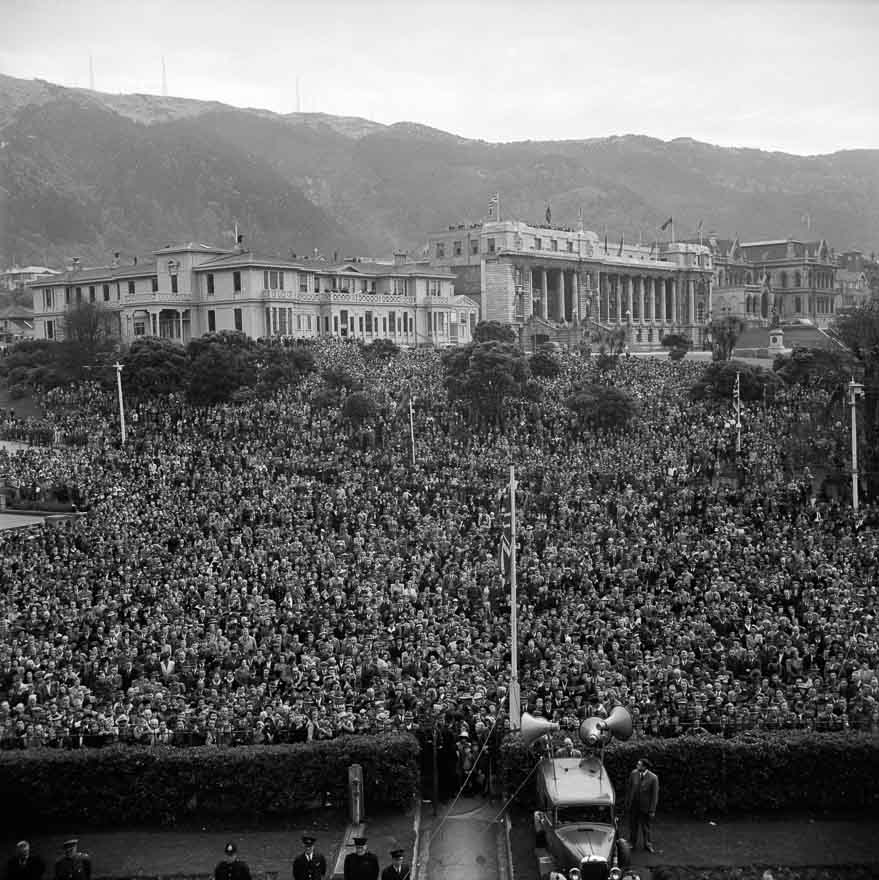 Tens of thousands of Wellingtonians celebrate the defeat of Nazi Germany in the streets below Parliament, 9 May 1945. But what would have happened to the Anglo-Saxon powers if they had failed what British military historian, Correlli Barnett, calls "the audit of war"?
Tens of thousands of Wellingtonians celebrate the defeat of Nazi Germany in the streets below Parliament, 9 May 1945. But what would have happened to the Anglo-Saxon powers if they had failed what British military historian, Correlli Barnett, calls "the audit of war"?THERE’S a price to be paid for always being on the winning side. States and peoples who have been found wanting by the twin audits of war and revolution are forced to learn from their mistakes. The victors are under no such obligation.
New Zealand has been on the winning side of practically every war it has ever fought. Alongside the other fingers of the Anglo-Saxon fist: the United States, the United Kingdom, Canada and Australia; New Zealand has never had to endure the ignominy of military occupation, nor the harrowing rigors of that other handmaiden of defeat – social revolution. On the contrary, our armed forces and our political institutions have emerged from the storm and stress of successive wars not only intact – but wreathed in the laurels of victory.
In the face of such incontrovertible evidence of success, even the most muted and respectful attempts at criticism tend to sound like crankiness – or worse.
But, just imagine that the First World War had been won by Germany, and that, in defeat, New Zealand, along with the other Anglo-Saxon powers, had undergone a series of debilitating economic and social upheavals, culminating in the establishment of a cruel and arbitrary dictatorship.
Upon finally emerging from this nightmare of repression, would we not, as a people, be extremely wary of the instruments of coercive state power: the Army, the Police, the Courts, and the Penal System? And wouldn’t we also place a much higher value on the traditional protections against such arbitrary and undemocratic regimes: the public administration of justice; the presumption of innocence; and the right to be tried by a jury of our peers?
I’d like to think so.
But, of course, the Anglo-Saxon fist has yet to meet its historical match. And that, I suspect, is why so many of us still put so much faith in the coercive instruments of the New Zealand State. They have, after all, never let us down. It would certainly explain why so many thousands of Kiwis flock to ANZAC Day parades, and why the funerals of slain policemen take on the character of state-funerals – replete with honour-guards, pipers and aerial salutes.
It might also explain why so many New Zealanders’ prefer retributive – as opposed to rehabilitative or restorative - justice. The outrage talk-back callers routinely express at the very idea that prison-cells might be constructed with under-floor heating, or that inmates might occasionally be permitted to watch a flat-screen television set, says a great deal about this darker side of the Kiwi character.
If they, or their loved ones, had ever spent time in a dank prison cell, reeking with the stink of their own excrement, I wonder if these talk-back callers would, like the Dutch, Danes and Norwegians (whose homelands were all occupied by the Nazis) begin to take a more humane view of crime and punishment?
It would certainly help them to understand why Maori, whose armies were defeated, whose society was forced to undergo a wrenching series of economic and social upheavals, and whose homeland has been occupied for more than one-and-a-half centuries, look upon the Police, the Courts and the Penal System of the New Zealand State through very different eyes.
Or, if that’s too big an empathetic ask, they could simply carry out this little thought experiment.
Imagine you’re living under a Government which has removed the right to elect trial by jury for offences punishable by less than three years imprisonment. Then imagine that, in spite of a referendum indicating the contrary, this same government has refused to repeal the law eliminating the defence of "reasonable force" for hitting one’s kids. Now imagine a Crimes Act which mandates a maximum of two years imprisonment for common assault (which includes smacking).
What does it all mean? It means that if you’re arrested by the Police, charged with assaulting your child, and you enter a plea of Not Guilty, you will no longer have the right to be judged by a jury of your peers. Instead, your case may end up being heard by a female District Court judge, with a law degree from Waikato University, who just happens to believe that Sue Bradford’s anti-smacking legislation is the bees-knees.
You see now how foolish it is to assume that the never-defeated, all-powerful, Anglo-Saxon state is always your protector?
This essay was originally published in The Timaru Herald, The Taranaki Daily News, The Otago Daily Times and The Greymouth Evening Star of Friday, 22 May 2009.

1 comment:
... if you’re arrested by the Police, charged with assaulting your child, and you enter a plea of Not Guilty, you will no longer have the right to be judged by a jury of your peers.I'd been wondering how long it would be until someone made this connection.
[but would not that comone assault carries a maximum penalty of 1 year; it is assault on a child that carries a two-year sentence]
Post a Comment